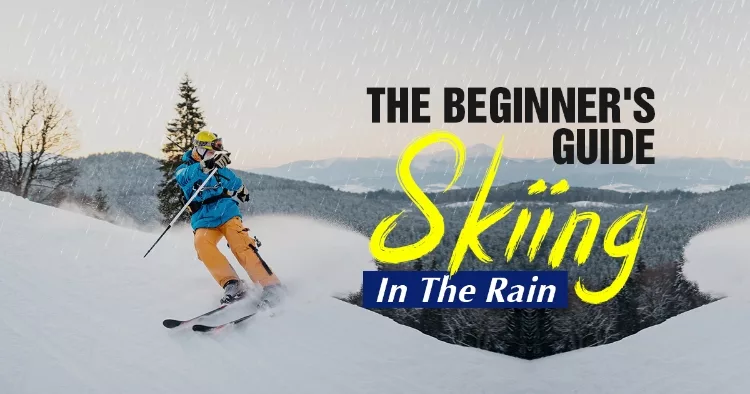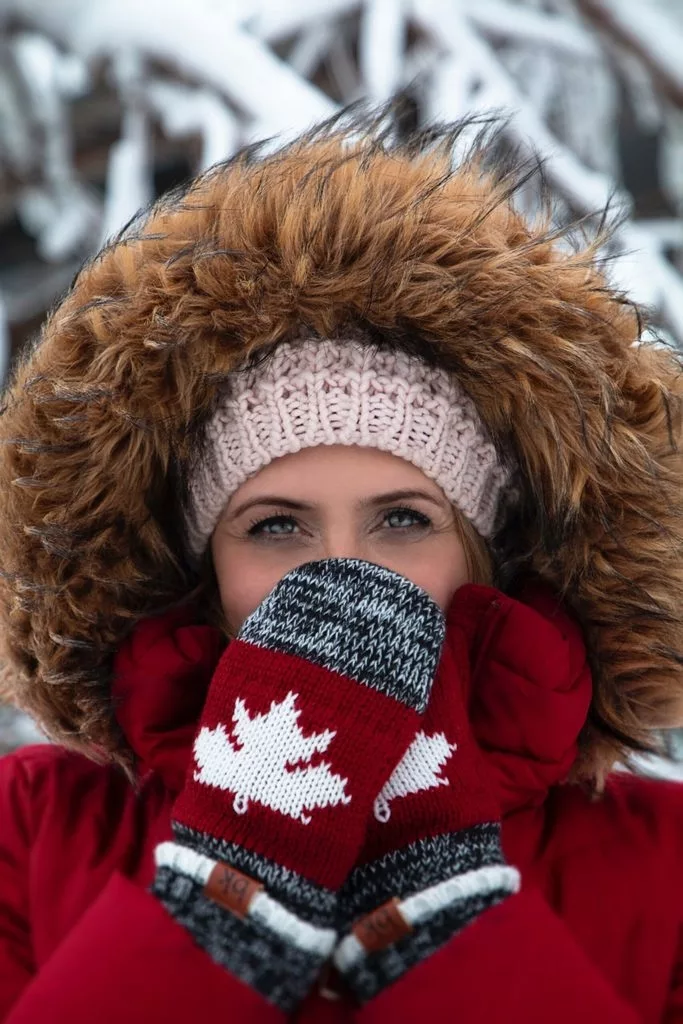Skiing In The Rain, The Right Way!
by Frank V. Persall
It may seem scary, and strange…. But, believe it or not, skiing in the rain is completely doable! It is, of course, a little different from skiing in the snow, however. Ski veterans may know everything about skiing in the rain, but other skiers may be a little unsure of some things.
Contents
How do you know when it’s safe? Is it more dangerous than usual? What do you need to look out for, on the course? Do you need different equipment, and how will it affect that equipment?

Your days of stressing over these questions are over; today, we’ll run you through all the “do’s and don’ts’” of skiing in rain!
Can You Ski While It's Raining?
In short; yes, but it’s not for everyone. Here’s the short-and-sweet of what you need to know about skiing in the rain:
- It’s more dangerous
- You will get cold and wet
- You will need some different equipment from your usual escapades in the snow
- Off-piste is quite slow, slushy, and you won’t enjoy much momentum
It’s not all bad, though! Plenty of folks actually love the feeling of hitting a rain-soaked ski slope. Why?
- The course will likely be near-empty; no more waiting for your turn on the lift!
- You’ll likely move much faster on a frozen track, due to slick ice with a layer of flowing water (this, obviously, is more dangerous, but more fun!)
- Good equipment can keep you fairly dry
- Some people just love to “embrace the suck”, and don’t mind getting soaked and wet regardless
Now, let’s get into the details of how you can ski in the rain!
How To Ski In Wet Conditions
This probably isn’t a surprise, but rain makes a big difference to a slope, and thus, you’ll need to adjust your technique. A track of packed powder, in particular, is likely to ice over. Meanwhile, off-piste snow will get slushy and wet. Now, how do you handle this?
In both cases, it comes down to practice, but here are some tips.
1. Glazed ice
A track of packed snow can freeze over very easily in the rain. This gives you an extreme skiing experience more speed, less control, and it’ll be pretty hard to stop. This can be loads of fun, and very dangerous. So, how do you handle it?
2. Edge control
You’ll be on a much slicker surface than you’re used to! Don’t be surprised if the track is icy and slick. You’ll want to be more patient with your edge control, and keep extra close track of your momentum.
3. You will slide so be patient, and don’t panic
Once again you’ll likely be on more iciness than you’re used to. You’ll want to be very patient and controlled when sliding that’s because you’ll be turning at a much wider radius, due to how you slip horizontally.
That’s just what happens when it’s slick. It’s just like hydroplaning when you’re driving the worst thing you can do is panic and overcorrect. Just grit your teeth, breathe, and trust your skis to do the work.
4. Use a somewhat wider stance
You’ll want to be a bit wider with your stance because you’ll need more strict balance control than usual. Pay keen attention to your directional momentum and balance, and be more cautious about how you shift your weight.
5. Edging vs pivoting
When on a track, you’ll have a hard time digging your edges into the snow, due to the ice. Frozen rain will have that effect. For most skiers, you’ll be best off simply sliding through your turns, instead of trying to force your edges deeper.
Is Wet Snow Good For Skiing?
Now, if you’re not on packed snow, you’ll be on wet snow, instead. What is this like? Does it ruin skiing, and is it even possible?
Well, it is possible, and some people prefer it.
Here’s what you need to know.
How do you ski in wet weather conditions?
If you choose to go off-piste, or if the snow on the track is loose, you’ll be going on something more akin to wet snow, instead of ice. Now, what does this mean for you?
Well, it means you’ll be in lots of slushy, or sticky, snow. This will happen if it’s raining, and/or if it’s warm.
Slushy Snow
The slush will keep you moving slower, and it can have a kind of a suction effect, because of how sticky it is. Some people love this type of skiing lots of people don’t.
Sticky snow will have the same effect, to a stronger degree. When it’s really warm or wet, and the snow is very sticky and slushy… Even veteran skiers can be caught by surprise, by this effect.
The end result of both cases is that your turns will be much slower, and you won’t get the same speed.
Be ready for it, and accept that you won’t get a lot of speed. Your turns will go more slowly, so just accept it, and ride through it.
What Do You Wear Skiing In The Rain?
Most people don’t like the feeling of getting soaked, cold, and wet. But, if you choose to ski in the rain, you should just accept the possibility of that happening. Still, here are some ways to maximize your dryness.
Clothing
Most often, the rain and snow will come in through the back of your coat, down your neck. Some people wear plastic trash bags, or rainproof ponchos to get a better seal and prevent this.
You’re probably thinking that your coat is waterproof but don’t put too much faith in this. There are different degrees of “waterproof”, and ski coats are very rarely built to handle a lot of moisture from rain. You’ll want a full-on rainproof poncho or coat, on top of your usual equipment.
Lastly, make sure you’ve got some spare socks. Bring as many as you realistically can!
Gear
Right off the bat, your ski lodge should have all their equipment properly waxed to handle the moisture. This isn’t something you should need to worry about yourself, but you should call ahead to be sure.
Your goggles will be a major factor in how safe and fun your experience is. You need to get a nice rag to dry them frequently, or better yet, a miniature squeegee. If you lift your goggles, you’re in for a world of trouble- the foggy air and moisture will get inside, obscuring your view.
Put your goggles on tightly while inside, and do not lift them even for a second until you’re back inside!
Make sure your equipment is perfectly waxed for the conditions, as it’s important for protecting your skiing equipment, and giving you a smooth skiing experience. Whether your lodge takes care of this, or you need to do it yourself, it’s something you definitely need to add to your checklist.
Lastly- bring some waterproof gloves. Ideally, bring some spares, and see if you can get the kind that perfectly locks to the coat, and keeps moisture away from your wrist!
How To Keep Warm In The Rain
As we all know, extreme coldness really comes from moisture penetrating your clothes. The most important thing is to keep dry, as best as you can. Cover your whole body- especially your neck- with something super water-proof. Some people use waterproof plastic trash bags for this- but be prepared to look silly. Anyway, as far as pure quality, nothing beats a waterproof poncho.
Take a break when you feel yourself getting soaked through. No matter how well your dress, water just has a magical way to get in. Take a break, enjoy some hot cocoa with lunch, and change into fully new dry clothes.
Most importantly of all; remember to bring some spare pairs of gloves, socks, and underwear! Change into those as frequently as you can, if you feel your old pair getting wet.

Does The Rain Ruin Skiing?
This really is an “eye of the beholder” question. Tons of skiers will say that rain makes skiing a totally unique, fun, interesting experience; completely outside the norm, and worth a try. Some even prefer it!
Plenty of others simply hate it. If you’re on a track, you’ll likely be on ice, where it’s very slippery, speedy, and dangerous. However, if you’re off-piste, and the snow is slushy, you’ll be slow and plodding, with your skis sticking to the snow. Both types of skiing can be annoying, but also have their fans, for their own reasons.
And, of course, you’re going to get soaked- and, likely, very cold.
Still, the rain does have its advantages; the slopes will be empty, you can get more speed on a frozen track (if you don’t mind a bit of extra excitement, this can be pretty fun). Plus, the feeling of coming inside, and changing into fresh dry clothes, with a hot cup of coffee or cocoa awaiting you… It’s just extra beautiful. It’s impossible to experience that, without grinning ear-to-ear.
What Happens To Snow When It Rains?
Let’s start with the obvious question; what, exactly, are you going to be putting your skis into?
Well, warmth combined with moisture will inevitably make snow slushy, and sticky. We’ll go into more details on how to handle this, but just know that it’s often compared to skiing on peanut butter.
Meanwhile, tracks of packed snow will get the opposite effect; they’ll ice over, and become slick and slippery.
Is Skiing In The Rain Dangerous?
Safety first!
Yes, the cold reality is that skiing in rain can be dangerous for a few reasons…
- The slopes will be emptier, so if you get in trouble and need help, you may not get it so easily
- You’ll have much more speed and much less control on icy tracks (this is the big one)
- It can be easy to get knocked off your skis if the snow is suctioning them too much, and the snow won’t protect you as well as when it’s powdery
- Your visibility will likely be much lower, and fog can impair your visibility; your goggles will be constantly wet, and your visibility gets messed up even more
- If you make the mistake of lifting your goggles mid- descent, you’re in trouble- the insides will get fogged and be totally opaque. You’ll have to either knock yourself over safely, or try finishing the slope semi-blinded, or simply do it without goggles as your bare, squinted eyes get whipped by high-speed rain. Not fun!
Conclusion
Skiing in the rain can be a fun, unique experience, and everyone should try it once.
Tracks will likely ice over and be slippery, whereas off-piste will be slushy and sticky. The conditions may suck, but you’ll have the track all to yourself; and, good preparation can keep you fairly dry!
Don’t let a bit of rain get you down. Skiing in the rain isn’t the same; but, plenty of people enjoy it, and some people love it. You might love it, too!
Related Posts:
30 of The Best And Worst Skiing Pick Up Lines
 |
 |
 |
 |

About Frank V. Persall
Frank is originally from the UK, but he has a passion for skiing that knows no bounds. He has made it his life's mission to visit the best ski resorts across the USA and the World. Frank loves spending time with his wife and three children on ski slopes, as they all share his love for the activity.
Thoughts on "Skiing In The Rain, The Right Way!"
 |
 |
 |
 |
You can get FREE Gifts. Or latest free skiing books here.
Disable Ad block to reveal all the info. Once done, hit a button below
 |
 |
 |
 |